We may earn a commission when you click on the affiliate links in this post.
This Authentic Italian Spaghetti recipe comes straight from Italy. Tomatoes, basil, onions, and carrots flavor the meat to make the perfect spaghetti sauce. This is the best spaghetti recipe you will ever try!
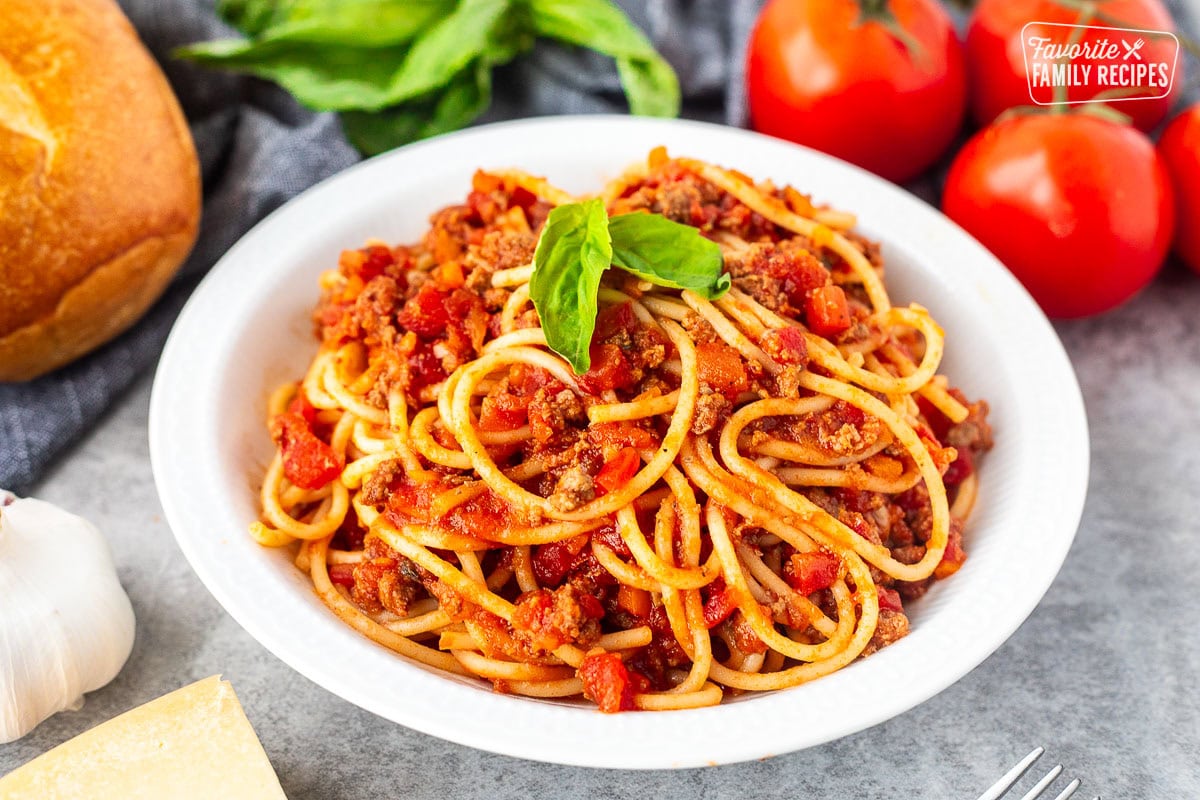
Table of Contents
- Nick’s Authentic Italian Spaghetti Recipe
- Ingredients You’ll Need
- Best Meat for Spaghetti
- Types of Spaghetti Sauce
- Tips For Making Italian Spaghetti
- Which Tomatoes Are Best For Homemade Spaghetti?
- How to Make Authentic Italian Spaghetti
- Authentic Italian Spaghetti Recipe
- Frequently Asked Questions
- More Delicious Pasta Sauces
- What To Serve With Spaghetti
Nick’s Authentic Italian Spaghetti Recipe
This authentic Italian spaghetti recipe, also know as ‘Nicco’s Sghetti’ in our family, delivers the classic comfort of spaghetti with a true taste of Italy. Many thanks to Nick, my husband’s brother, for sharing this recipe with us! He spent two years in Italy and brought home all sorts of delicious, Italian recipes. This classic spaghetti recipe quickly became a family favorite.
Ingredients You’ll Need
- Extra Virgin Olive Oil: To sauté the vegetables.
- Vegetables: Carrots, onions, and garlic are sautéed as a base for the meat sauce.
- Meat: We use a combination of ground beef and ground pork.
- Tomatoes: Garden fresh or D.O.P. San Marzano canned tomatoes for the spaghetti sauce.
- Basil Leaves: Fresh basil leaves add incredible flavor.
- Sugar: Just a pinch is used to balance the acidity of the tomatoes.
- Kosher Salt and Pepper: To season the sauce.
- Beef Broth: This is used to thin the sauce as it simmers, as needed.
- Spaghetti Noodles: For best flavor and texture, use spaghetti or pasta imported from Italy, or make your own pasta.
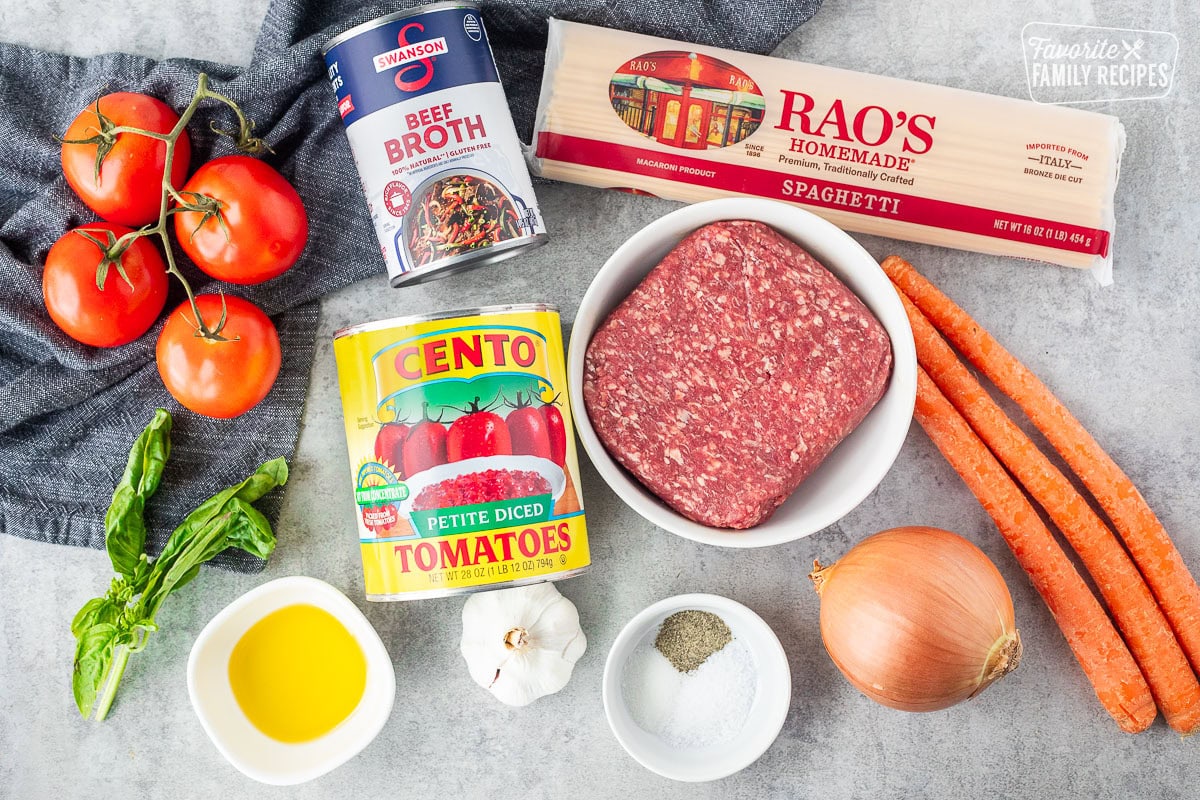
Best Meat for Spaghetti
A combination of ground beef and pork is ideal for this spaghetti sauce. Here in the U.S., we often think spaghetti is limited to meatballs or ground beef, but in Italy you can find ragù using braised beef, lamb, chicken, fish, veal, or pork. Depending on what region in Italy you are visiting (or using recipes from), meat can be simmered in large portions and then removed and served separately from the pasta and sauce, or the meat can be cut or broken into smaller pieces and served in the sauce. Either way, the meat is simmered in the sauce to give the sauce that deep, rich, meaty flavor.
Types of Spaghetti Sauce
The meat sauce for this spaghetti is a true Italian “ragù”. So what exactly does that mean? It is easy to get confused with all of the different kinds of “red” pasta sauces. What’s the difference? IS there a difference? Truth is, they are all similar and some are simply variations of one another, but they have their differences. Allow me to explain…
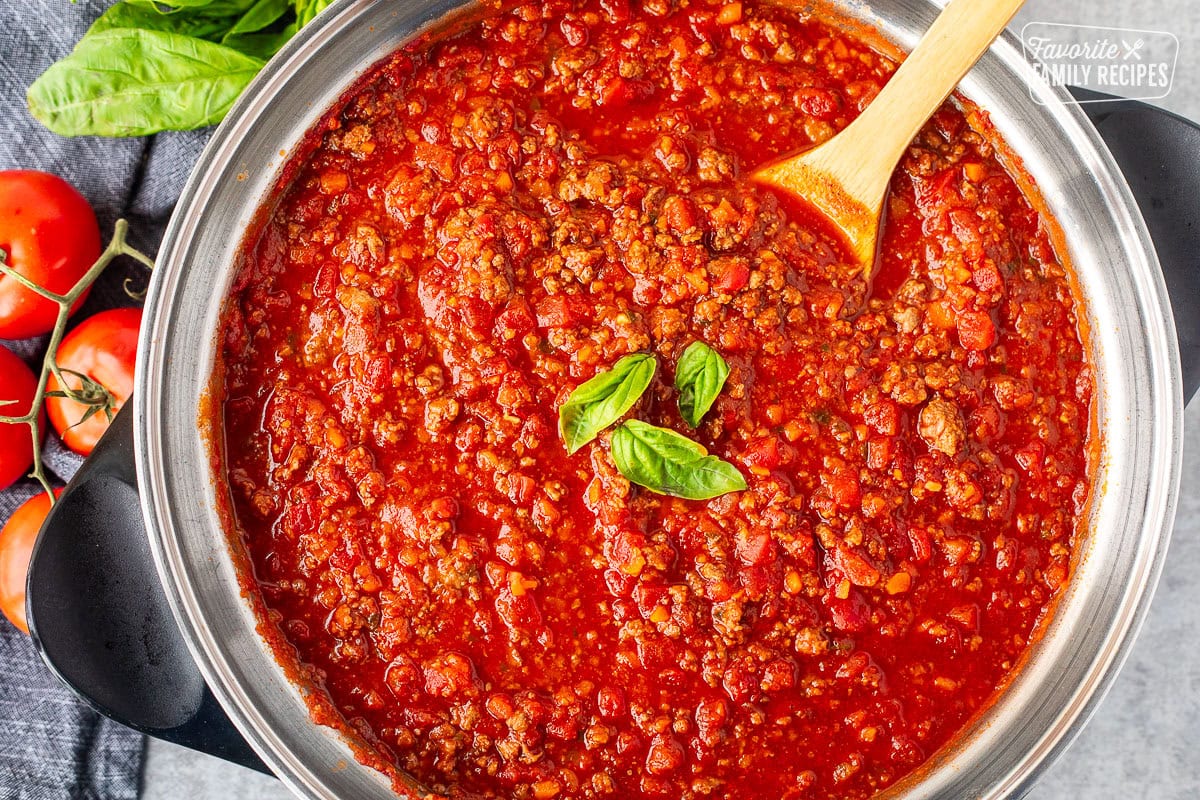
Common Spaghetti Sauces:
- Ragù – Ragù is a meat-based sauce made with sautéed vegetables and simmered slowly for hours in tomato, broth, wine, and/or milk. There are two common variations of ragu: Ragu alla Bolognese and Ragu alla Napoletana.
- Ragù alla Bolognese (aka Bolognese) – From the Bologna (Northern) region in Italy. Uses less tomatoes and white wine. Traditionally served with wide pasta or lasagna.
- Ragù alla Napoletana – From the Naples (Central/Southern) region in Italy. Uses more tomatoes and red wine. Traditionally served with thinner pasta, such as spaghetti.
- Pomodoro Sauce – (also known as Sago di Pomodoro) is a simple tomato sauce that is smooth and flavorful. It is another great authentic sauce for spaghetti that we got from Italy!
- Marinara – Marinara is a simple tomato sauce with common Italian seasonings. Unlike the sauces above, marinara is heavily tomato based and does not contain meat. Though the sauce is mostly tomatoes, it may or may not include onion or other vegetables. Marinara is bright, acidic, and light, as opposed to the above sauces which are more rich, hearty, and complex.
- Spaghetti Sauce – Spaghetti sauce is an Americanized term for any kind of red sauce that is served over noodles. It can include any of the sauces above. Be sure to try our Homemade Canned Spaghetti Sauce. This is our favorite way to make our fresh, garden tomatoes last all year!
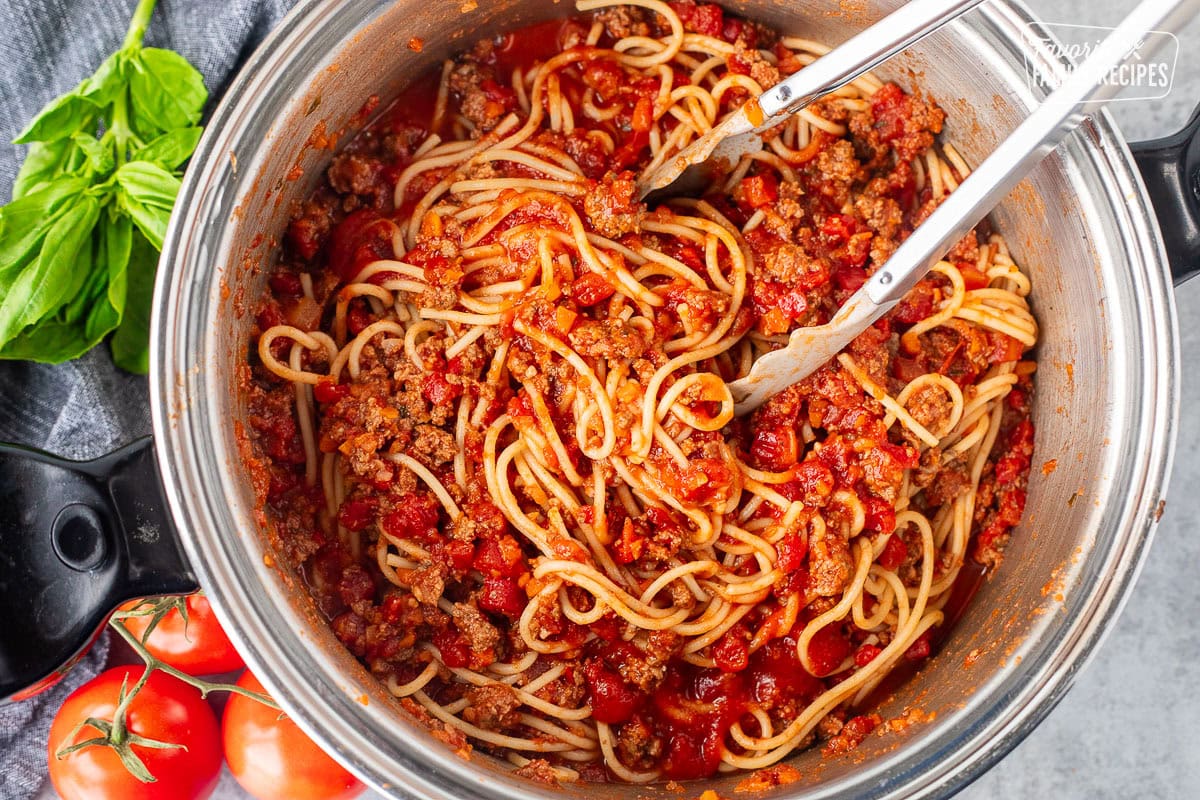
Tips For Making Italian Spaghetti
Learning to get the perfect spaghetti and sauce takes some practice but once you get it down, it’s easy! Here are some tips for making the perfect Italian spaghetti:
Tips for cooking the pasta
- Salt the pasta water. Not just a pinch. You want to add a good amount, enough that when you taste the water you can distinctly tell that there is salt there.
- Stir While Cooking: Stir the pasta immediately after adding it to the boiling water to prevent sticking. Stir occasionally during cooking to ensure even cooking.
- Cook Al Dente: Follow the recommended cooking time on the pasta package, but taste-test a minute or two before it’s supposed to be done. The pasta should be firm to the bite (al dente).
- Save Pasta Water: Before draining the pasta, reserve a cup of the pasta cooking water. It’s rich in starch and can be used to adjust the consistency of your sauce.
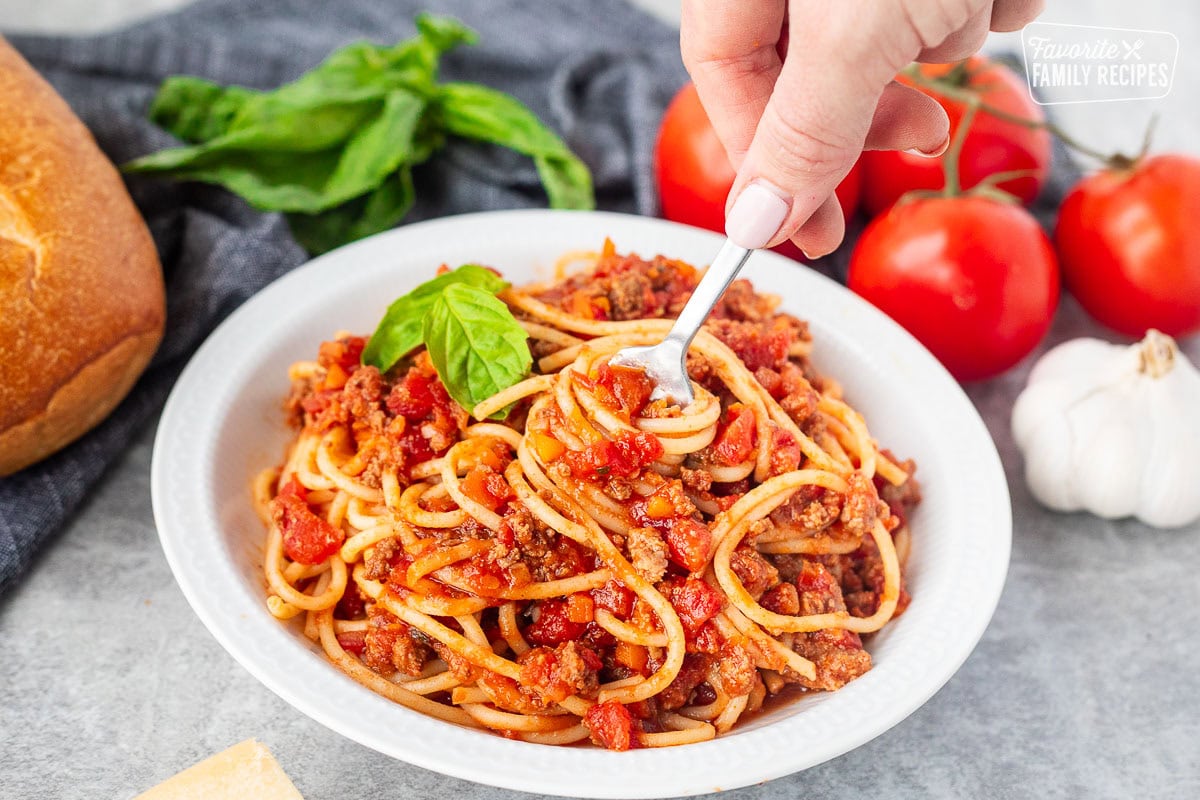
Authentic spaghetti sauce tips
- Use Good Tomatoes. If you can’t peel and dice your own fresh garden tomatoes, whole canned D.O.P. San Marzano tomatoes (from the grocery store, look for the DOP label) are the best substitution.
- Let It Simmer. The best spaghetti sauces take time. The longer you can let those flavors reduce and simmer together, the better. In many Italian kitchens, the sauce will simmer all day long before being served. It will get nice and thick without having to add tomato paste!
- Use Ground Pork. You can use all pork or a mixture of pork and beef.
- Red Wine (optional): add a splash of red wine to the meat after browning but before adding the other ingredients for a new dimension of flavor.
- Toss It All Together: In Italy (at least in the region where Nick lived), they don’t pour the sauce over the noodles. It is all tossed together and then served!
- Fresh Herbs: Use fresh herbs like basil, oregano, and parsley to garnish and flavor your pasta. Add them just before serving to preserve their freshness.
- Balance the Sauce: Taste your sauce and adjust the seasoning as needed. You might need a pinch of sugar to balance acidity or some salt and black pepper for flavor.
- Cheese: Grate or shave fresh Parmesan or Pecorino Romano cheese over the pasta. This adds a salty, nutty flavor that complements the sauce.
- Don’t Over-Sauce: The sauce should coat the pasta, not drown it. Start with a small amount and add more as needed.
- Finish in the Pan: Finish the pasta in the pan with the sauce for a minute or two. This allows the flavors to meld. Use a little reserved pasta water if needed to thin.
- Serve Hot: Serve your Italian spaghetti piping hot for the best taste and texture.
Which Tomatoes Are Best For Homemade Spaghetti?
If using fresh tomatoes, you can never go wrong with a good Roma tomato for spaghetti sauce. Romas are good, meaty tomatoes with few seeds and cook down well into a sauce after they are heated. Dip them in boiling water for 30 seconds to make removing the skins easier before cooking. If using canned tomatoes, my VERY favorite are San Marzano tomatoes. These tomatoes come straight from Italy and they are by far the best. I like getting the 28 oz. can of the whole, peeled tomatoes and crushing them myself with a spatula after they soften and simmer down. They are much better than using crushed tomatoes.
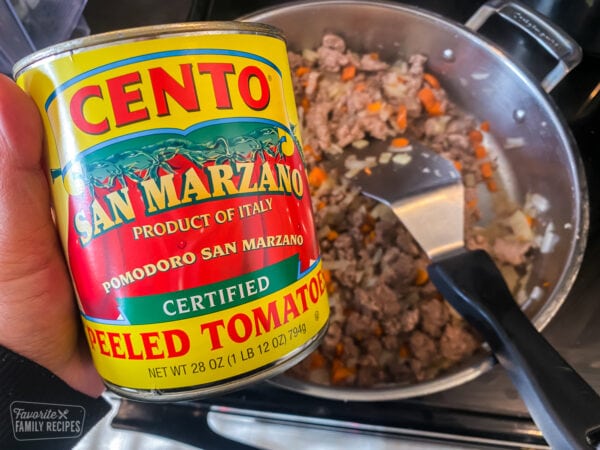
How to Make Authentic Italian Spaghetti

Authentic Italian Spaghetti
Equipment
- Large Skillet (we love these cast iron ones from Camp Chef)
- large pot
Ingredients
- 1 tablespoon olive oil
- 1 small onion finely chopped
- 3 carrots peeled, chopped
- 4 cloves garlic (crushed or minced)
- 1 pound ground beef
- 1/2 pound ground pork
- 1 1/2 pounds tomatoes (fresh peeled and diced tomatoes or canned San Marzano tomatoes)
- 6 fresh basil leaves chopped (or 1-2 teaspoons dried basil)
- 1/2 teaspoon sugar
- 1 teaspoon Kosher salt
- 1/2 teaspoon pepper
- beef broth (if need to thin sauce while simmering, you can also use pasta water or a splash of red wine)
- 1 pound spaghetti noodles
Instructions
- Heat oil on medium heat in a large, deep skillet. Add onion, carrots, and garlic and sauté for 1 minute. Add ground beef and pork and continue to cook.
- When meat is browned and onions are soft, add tomatoes.
- When tomatoes have softened and have started to release their juices (about 4-5 min) add basil, sugar, salt and pepper. If you are using whole tomatoes, mash them with a potato masher or spatula to release all their juices.
- Simmer for at least 3 hours, or up to 6 hours, stirring occasionally. The longer you simmer, the better. Important: Tomatoes burn easily, so keep an eye on them and add beef broth a little at a time to thin sauce if needed.
- In a large pot, cook spaghetti in salted water to al dente, drain completely and return to pot. Add sauce to the spaghetti noodles and toss until noodles are covered.
Video
Notes
Nutrition Information
Frequently Asked Questions
Adding a pinch of sugar to your pasta sauce creates a more balanced sauce by cutting the acidity of the tomatoes. The acidity of tomatoes varies depending on whether or not they are canned or fresh, the time of year it is, and the type of tomato they are. Just give your sauce a taste and stir in some sugar accordingly only if needed.
While I cannot speak for all Italians, the general consensus is no, they do not. Putting oil in the water makes the pasta slippery and thus, makes it harder for the sauce to stick to the pasta when it is done cooking. Instead, they will boil the pasta in a very large pot of water (so there is plenty of room in the pot, so nothing sticks to anything else) and will sometimes salt the water.
Typical American spaghetti sauce comes in a jar and is a complex blend of spices, flavors and additives combined with a tomato base. Authentic Italian spaghetti sauce (whether it be marinara, ragu, or pomodoro) is often homemade and starts with fresh tomatoes combined with a small handful of basic, fresh ingredients.
Read Next: Spaghetti Casserole
More Delicious Pasta Sauces
What To Serve With Spaghetti
When we were growing up, our mom would almost always serve spaghetti with frozen peas. You can also serve your spaghetti with a side salad, or one of these tasty side dish ideas:
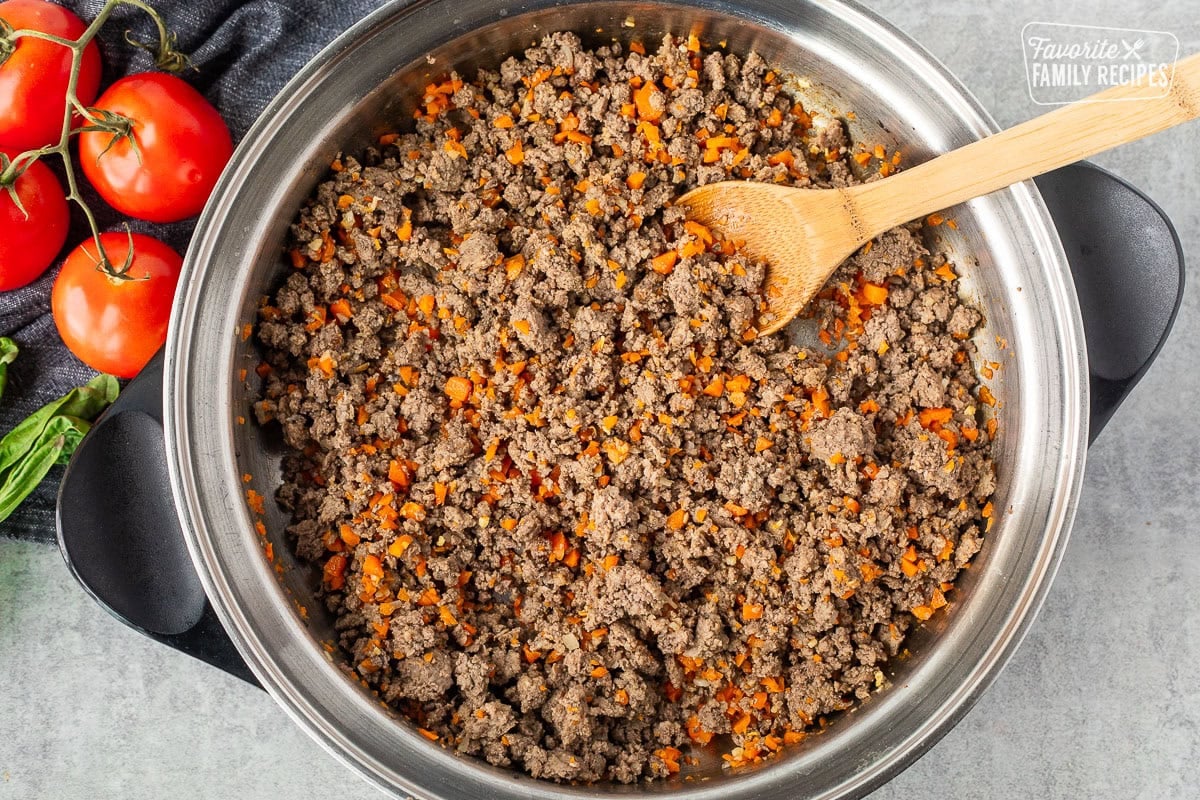
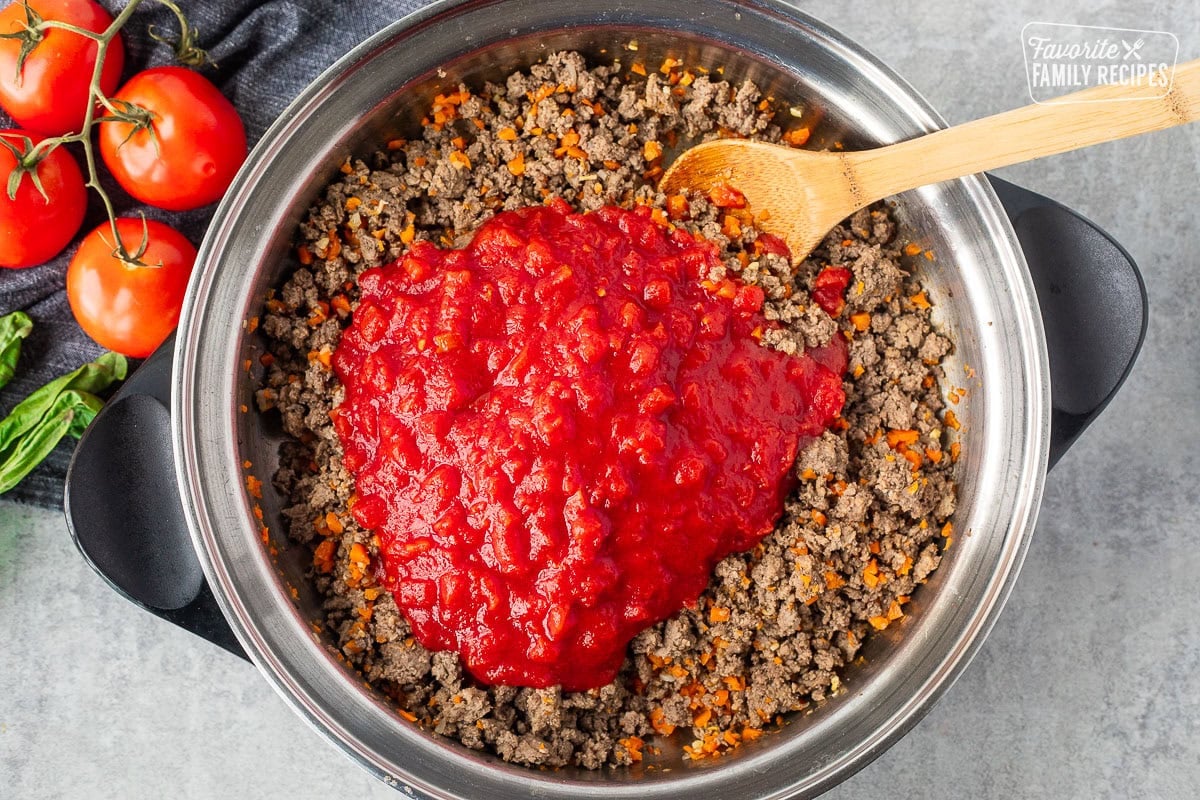

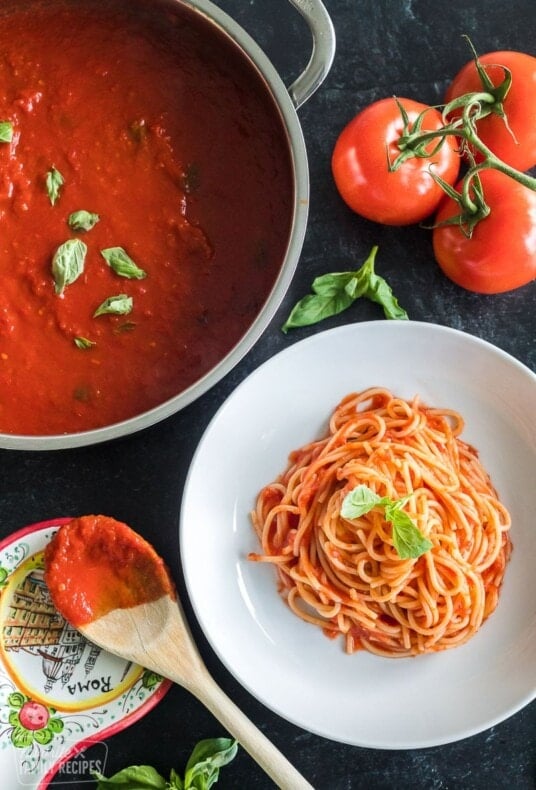
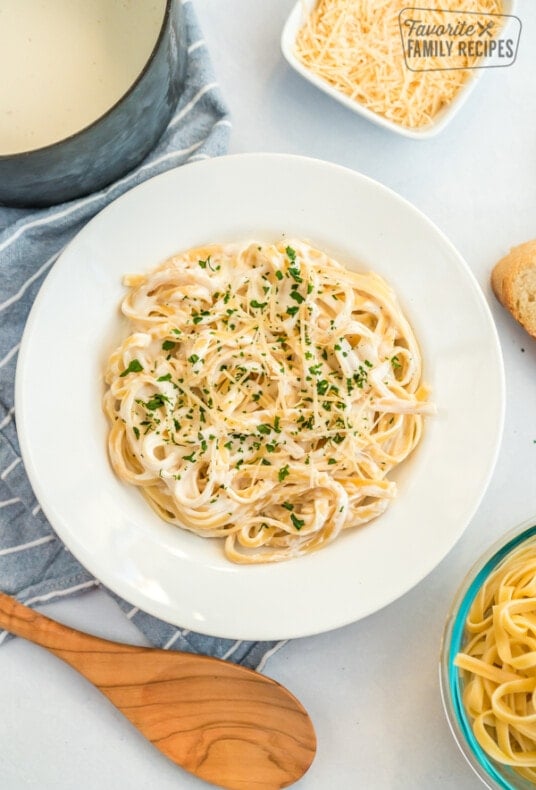

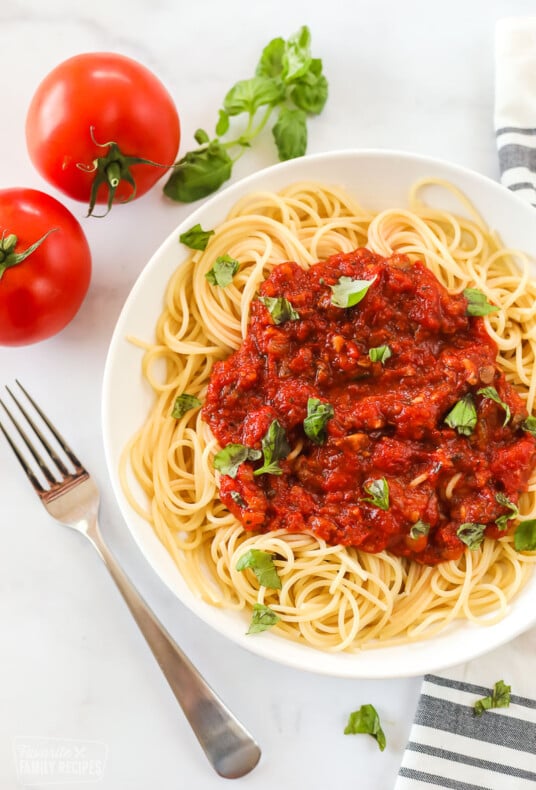
Was looking for a recipe with carrots !! Making it today.
I hope you enjoy them!
I’ve a recipe similar to this one that I’ve meaning to try. I love good meat balls lazana pizza meat balls subs .I am going to soon. But interested in finding that one recipe. What do you call a clove of garlic 🧄 to you. The whole bloom or the portion that come apart?
Great question! A clove of garlic is a single segment of the garlic bulb or whole bloom. Thank you for asking!
The instructions say garlic, but there’s no garlic in the ingredients list. How much garlic does the recipe need?
Whoops, I don’t know where that could have gone! It is 4 cloves, crushed. I added it back into the recipe card.
What size are the pots or pans?
I usually use my large skillet (12″) and a 12-quart stock pot, but you can probably use an 8-quart too. Hope this helps!
Haven’t tried this yet, but it seems familiar to that used by the Ladies of St. Anthony’s church in Little Italy now called SOHO.
Great!
Thanks!
This was very informative & helped in perfecting my personal recipe.
BEST SPAGHETTI SAUCE EVER , I NEVER ATE A BETTER ONE THAN THIS GREAT SAUCE . 👍 👌 😋😋😋😋 WOW ! ! 🥰😍🤩🤗😋😋